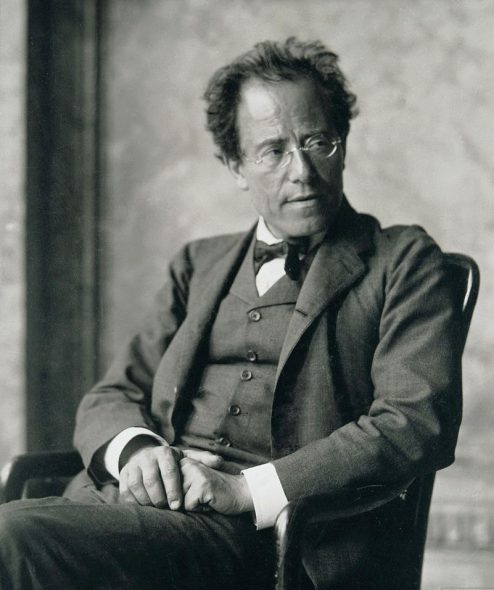MSO Takes on Mahler’s Titanic Song Cycle
Das Lied von der Erde paired with potent works by Britten and Foss.
Poetry, pastoralism, and passion mark the Milwaukee Symphony’s weekend performances of works by Foss, Britten, and Mahler. It may be what T. S. Eliot called “the cruelest month,” but April is also a month to observe conservation of the natural world. The symphony celebrates Earth Month with the monumental work by Gustav Mahler, Das Lied von der Erde, The Song of the Earth.
Asher Fisch returns to Milwaukee, joined by mezzo soprano Michelle DeYoung and heldentenor Stuart Skelton for Das Lied von der Erde. Both DeYoung and Skelton are known for their exceptional performances of Wagnerian opera, offering a hint of the scale and power of the Mahler work.
The program opens with Lukas Foss’s Three American Pieces for violin and orchestra. The soloist is Bulgarian-born Bella Hristova, known for a wide-ranging repertoire that sweeps from Bach to Corligiano. Foss wrote that his work was composed “at a time when I was in love with my newly adopted country.” His inspirations were poetry by Carl Sandburg and the “open-air quality” of the music of Aaron Copland. The final movement, “Composer’s Holiday,” is a hoedown.
Benjamin Britten’s Four Sea Interludes, a series of short tone poems drawn from his opera Peter Grimes, are also influenced by poetry, that of eighteenth-century English writer George Crabbe. Crabbe was born in Aldeburgh, Suffolk, an ancient Roman settlement along the east coast of England whose very name (Aldeburgh means “old city”) encodes its history. Britten was born a few miles to the north, in Lowestoft, but spent most of his adult life in Aldeburgh.
This is a place of rough waves and shipwrecks, of shoals and sandbanks, where walking near the north sea in a gale means being battered backward by the winds. Britten’s music of the sea not only reflects the psychology of the flinty and brutal characters in the opera Peter Grimes, but also paints the water as a mercurial character, a force that defines lives, offers a way of life and claims lives.
In an introduction to the opera prior to its first performance, Britten explained his relationship to the sea. “For most of my life I have lived closely in touch with the sea. My parents’ house in Lowestoft directly faced the sea, and my life as a child was coloured by the fierce storms that sometimes drove ships on to our coast and ate away whole stretches of the neighbouring cliffs. In writing Peter Grimes, I wanted to express my awareness of the perpetual struggle of men and women whose livelihood depends on the sea – difficult though it is to treat such a universal subject in theatrical form.”
Despite the picturesque titles “Dawn,” “Sunday Morning,” “Moonlight,” and “Storm,” Britten’s music is unlike the romantic effulgence of Ralph Vaughan Williams’s nostalgic nationalism or J. M. W. Turner’s heroic nineteenth-century canvases. A modernist, Britten’s searing clarity and unadorned realism describes a natural world that is ultimately indifferent to human struggle.
Benjamin Britten‘s Aldeburgh, scenes of the town. Royal Opera House (5 minutes).
Interestingly, Britten heard in Mahler’s Das Lied von der Erde a voice of the sublime that expressed his own sense of passion and pain. Writing to a friend, he said, “It is cruel, you, know that music should be so beautiful.”
Das Lied von der Erde is based on a translation of Chinese poems by Hans Bethge, Die chinesische Flöte, The Chinese Flute (1907). Prior to their publication in Germany, the verses by classical poets Li Tai-Bo, Chien Chi, Mong Kao-Jen, and Wang Wei had been popularized by translations into French, part of the fashion for chinoiserie in the second colonial empire of the nineteenth century.
Mahler discovered Die chinesische Flöte at a propitious time in his life, an instance of what the Greeks called kairos, or “the right time.” His wife Alma remembered his anxiety over his failing heart. “He was always stopping on a walk to feel his pulse and he often asked me to listen to his heart and see whether the beat was clear or rapid or calm.”
Das Lied von der Erde moves through a complex series of key changes. Familiar musical motifs from Mahler’s symphonic works appear: horn calls, bells and birdsong. These are paired with evocations of a distant, imagined world, one filled with lotus-flowers, falling leaves and the rising moon.
The final word of the song cycle is ewig — forever. Mahler uses sixty-four measures to express it, emphasizing its centrality to understanding the work as a whole. So crucial were these final lines that Mahler rewrote Bethge’s bucolic pastoralism, which read “The earth is the same everywhere. And the white clouds are forever, forever.” Mahler intensified the expression of natural and spiritual rebirth: “The dear earth everywhere blossoms in spring and grows green again! Everywhere and forever the distance shines bright and blue! Forever . . . forever . . .”
Leonard Bernstein’s musical analysis of “Der Abschied” (The Farewell), 10 minutes.
“Asher Fisch Conducts Mahler” will be performed on Saturday, April 21 at 8:00 p.m. and Sunday, April 22, Earth Day, at 2:30 p.m. Performances take place in Uihlein Hall at the Marcus Center, 929 N. Water St., Milwaukee. Program notes are available online here. Tickets are available from the Marcus Center for the Performing Arts by calling 414-273-7206.
Preview
-
A Sacred Choir, 70 Voices Strong
 Dec 14th, 2025 by Martha Brown
Dec 14th, 2025 by Martha Brown
-
Prometheus Trio Goes Bohemian
 Dec 3rd, 2025 by Martha Brown
Dec 3rd, 2025 by Martha Brown
-
Present Music Offers New Choral Works
 Nov 20th, 2025 by Michael Barndt
Nov 20th, 2025 by Michael Barndt






















